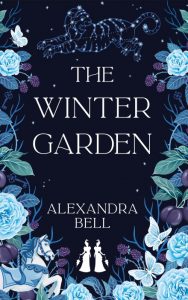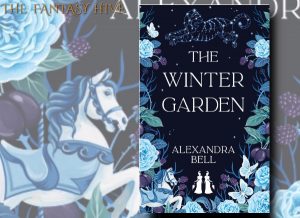THE WINTER GARDEN by Alexandra Bell (BOOK REVIEW)
Content warnings: Death of parents and children, and grief; spousal abuse in all forms; drug use; pregnancy complications and intense postpartum depression.
Welcome to the Winter Garden. Open only at 13 o’clock.
You are invited to enter an unusual competition.
I am looking for the most magical, spectacular, remarkable pleasure garden this world has to offer.
On the night her mother dies, 8-year-old Beatrice receives an invitation to the mysterious Winter Garden. A place of wonder and magic, filled with all manner of strange and spectacular flora and fauna, the garden is her solace every night for seven days. But when the garden disappears, and no one believes her story, Beatrice is left to wonder if it were truly real.
Eighteen years later, on the eve of her wedding to a man her late father approved of but she does not love, Beatrice makes the decision to throw off the expectations of Victorian English society and search for the garden. But when both she and her closest friend, Rosa, receive invitations to compete to create spectacular pleasure gardens – with the prize being one wish from the last of the Winter Garden’s magic – she realises she may be closer to finding it than she ever imagined.
Now all she has to do is win.
I really wasn’t sure what to expect from this book, but I certainly wasn’t expecting it to blow me away like it did. It feels like any story with a dreamy magical component gets compared to The Night Circus, but almost none of them capture the special feeling that made that a great book – The Winter Garden, however, deserves the comparison, while also being an entirely different beast. This is a book that interweaves darkness and whimsy, using the contrasts of painful reality and sparkling magic to really dig deep into beautiful, emotional character work. I haven’t stopped thinking about the leads, Beatrice and Rosa, for weeks. It is quite a dark read, so do make use of the content warnings above and go particularly carefully if you’re sensitive to domestic abuse and child death, because they are central to much of the book.
 A lot of the marketing of this book focuses on how whimsical and magical it is, and that is to some extent fair. There is plenty of gorgeous, Night Circus-y magic, and the depictions of the Winter Garden are stunning, don’t get me wrong! But to only go into this book just wanting cool magic would be a disservice to the book and yourself as a reader, because that is beautiful trimming on top of a much darker, more intense story. The competition aspect is important, but while I thought it might offer a fairly typical fantasy trial storyline, with Beatrice and Rosa racing to find dramatic magical items, it’s actually much quieter than that, allowing us to look carefully at their lives and motivations and what makes them tick. This is a character-focused book at its heart, and it pulls that off to perfection, full of nuance and believably flawed people just striving to feel okay. What really made this book sing for me was how powerful and realistic the depictions of mental illness and the stressful early days of motherhood were, and how the Victorian setting works beautifully as both a backdrop and a cage for both women. This is a book deeply concerned with women’s lives – the ways the world tries to deprive them of power and the ways they fight back. But, given that I’m not generally a fan of that style of “normal” historical fiction, I don’t think that I would have loved it so much if that darkness wasn’t balanced with the wonder of the Garden… You know I hate an unrelentingly miserable book, and I’d hate to give you the impression this is depressing when I found it quite the opposite; it’s the juxtaposition that makes it work.
A lot of the marketing of this book focuses on how whimsical and magical it is, and that is to some extent fair. There is plenty of gorgeous, Night Circus-y magic, and the depictions of the Winter Garden are stunning, don’t get me wrong! But to only go into this book just wanting cool magic would be a disservice to the book and yourself as a reader, because that is beautiful trimming on top of a much darker, more intense story. The competition aspect is important, but while I thought it might offer a fairly typical fantasy trial storyline, with Beatrice and Rosa racing to find dramatic magical items, it’s actually much quieter than that, allowing us to look carefully at their lives and motivations and what makes them tick. This is a character-focused book at its heart, and it pulls that off to perfection, full of nuance and believably flawed people just striving to feel okay. What really made this book sing for me was how powerful and realistic the depictions of mental illness and the stressful early days of motherhood were, and how the Victorian setting works beautifully as both a backdrop and a cage for both women. This is a book deeply concerned with women’s lives – the ways the world tries to deprive them of power and the ways they fight back. But, given that I’m not generally a fan of that style of “normal” historical fiction, I don’t think that I would have loved it so much if that darkness wasn’t balanced with the wonder of the Garden… You know I hate an unrelentingly miserable book, and I’d hate to give you the impression this is depressing when I found it quite the opposite; it’s the juxtaposition that makes it work.
(One tiny note about the formatting of this book: there are long epistolary sections, and the letters are printed in different handwriting fonts. I found one of these fonts incredibly difficult to read, which spoiled the flow of the book for me. I hope that this is less of a problem in the finished copy, as I did read a proof, but I wish publishers would stop making this choice in pursuit of aesthetics when they can so easily spoil the reading experience. Readers are perfectly able to understand the concept of a handwritten letter without needing it to be in fake handwriting! But this is such a minor niggle.)
I’ll be honest, I’ve spent hours thinking of what I can tell you about this book that isn’t going to spoil the reading of it, because once I’d read it I really appreciated discovering it from scratch, and picking up all the little pieces that made it fit together for myself. It made me cry, it made me huff in frustration, it made me laugh, and it left me absolutely, desperately rooting for these characters to find a way for both of them to be happy (and for the villain to get a drastic comeuppance). It’s gorgeously written. There’s really not much more that I can say than that I was hooked from start to finish, and beyond.
Fans of The Ten Thousand Doors of January should give this a try: they’re not that similar in content, but I think they have a shared vibe in terms of the fantastic being a vehicle for intensely personal stories of women searching for their own stories. It would also work for those who loved the darkness of Wendy, Darling. I’ll also mention that the comparison that sprang to mind for me most while reading was A Little Princess, with its mix of tragedy, hope, and magic (though the magic here is much more real than Sara’s, obviously). The Winter Garden is really something lovely that took me by surprise.


[…] Reviews: Asha @ The Fantasy Hive, Claire @ Bookish Reads and Me🍂 Related: For better historical fiction (with just a touch of the […]